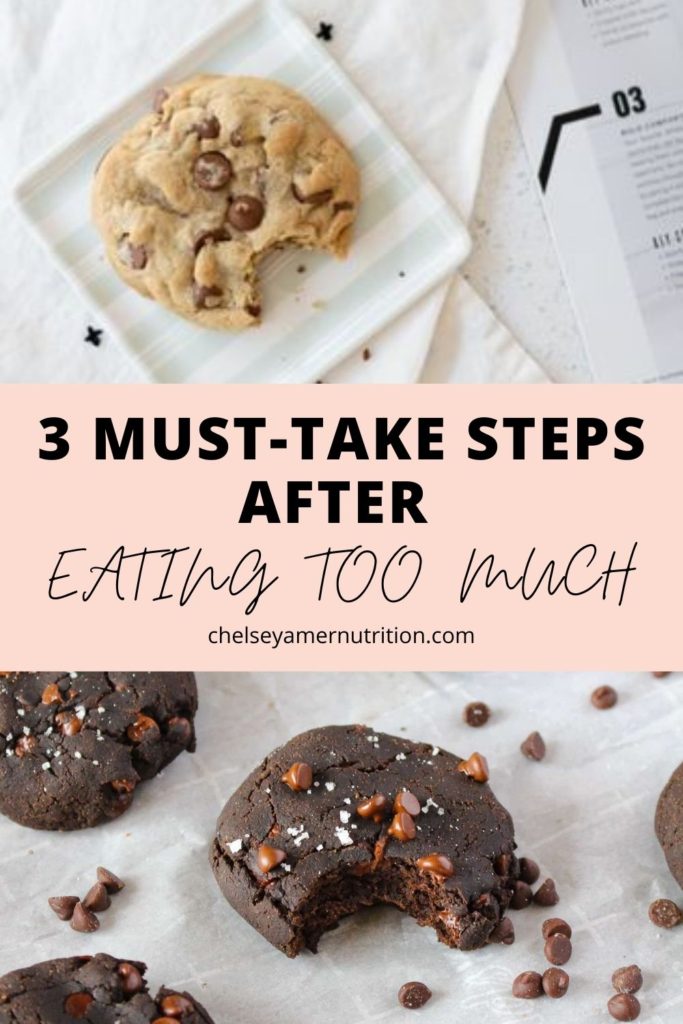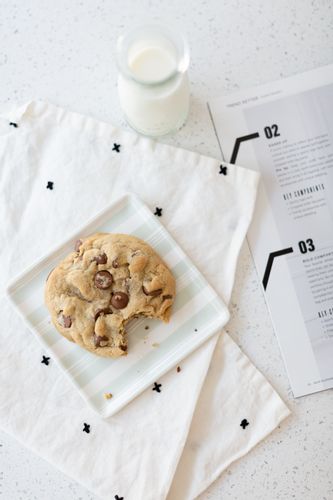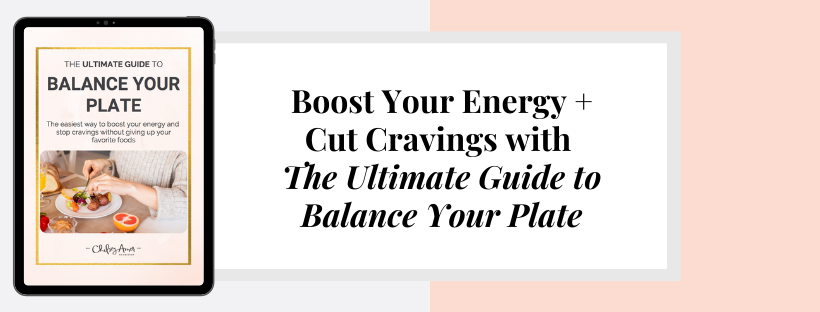3 Dietitian-Approved Must-Take Steps After Eating Too Much
Overeating… it happens to EVERYONE! But instead of beating yourself up or taking drastic measures to erase it, follow these 3 dietitian-approved must-take steps after eating too much…

How do you usually treat your body after eating too much?
Are you someone (like many of my clients and my past self) who beats yourself up over it? Do you ever feel guilty or shameful for eating past your point of comfortable fullness?
If yes, I want you to know that overeating or eating a bit too much happens to everyone… even dietitians (me!) who know how to follow their fullness cues on a usual basis.
That’s right… even if you know how to tell when you’re full, it’s possible to overeat.
When I refer to the terms “overeating” or “eating too much,” in this blog post, I’m pointing to those times your pants feel a little too tight after a meal. Or you ate past your point of comfortable fullness and maybe even feel a little sick.
Many of my clients report feeling guilty after eating too much and then take steps to exercise, detox, fast, and/or cleanse after eating too much… but these aren’t the right steps to take.
Instead, follow these 3 Must-Take Steps After Eating Too Much:
- Reflect on the situation
- Make plans to gently move your body
- Eat a balanced meal or snack the next time you feel hungry
Let’s break down these 3 steps after eating too much in a little bit more detail:
1. Reflect on the situation
We can’t learn from our actions unless we take the time to reflect on what happened. When you reflect on the overeating circumstance, I want you to ask yourself…
- Was I aware that I was eating past my point of comfortable fullness?
- Did I mindlessly overeat or was it a thoughtful choice?
- Did I eat too much because I thought I couldn’t have this food again in the near future?
- Was it because I was really enjoying the taste of my food?
- What could I have done differently next time to avoid this uncomfortable feeling?
Here’s why these questions are important…
Was I aware that I was eating past my point of comfortable fullness?
Asking yourself this question is asking yourself if you had a mindful eating experience. Did you use mindfulness tools, like checking in with your hunger level and fullness cues throughout the meal? Did you eat slow enough to check in with yourself?
If not, this is something to work on for next time. Check out this blog post about listening to your hunger and fullness cues.
If yes, what was the reason for eating too much to the point of feeling uncomfortable? Was it a conscious decision because your food was tasty? Although you may feel a little uncomfortable, that’s great that you purposefully made that decision with yourself.
Did I eat too much because I thought I couldn’t have this food again in the near future?
If you mindfully decided to take the steps to keep eating past your point of fullness, let’s take a look at why.
Once common cause for feeling guilty after eating too much is that you may think you ate a “forbidden food” or a food that you categorize as “off limits.”
When we eat foods that we keep as off limits, we have a deprivation mindset. It’s much more common to over eat when we think we can’t eat that food again. This is the classic restriction/deprivation cycle I talk about in this blog post.
If this is the cause of eating past your point of fullness, it’s important to end the restriction cycle after eating too much. This means – eat again and work on giving yourself permission to eat ALL foods (more on this below).
Was it because I was really enjoying the taste of my food?
After eating too much, ask yourself if it was simply because you were enjoying the taste of your food. This is 100% NORMAL and OK! Especially if it’s a holiday, you’re traveling, or eating outside of your mundane day-to-day life.
But even if it is in your day-to-day life, THAT’S OK too! What we don’t want is for you to feel UNCOMFORTABLE after eating… because who wants that?
Eating too much at times happens to everyone. If it’s a pattern for you, however, we want to get down to the root cause of it. That’s where keeping a food journal and working with a dietitian comes in handy.
What could I have done differently next time to avoid this uncomfortable feeling?
The final question to ask yourself as you reflect upon your overeating experience is to think forward instead of looking back. It happened… you ate too much… but what can you do next time to prevent this feeling you’re sitting with right now?
Eating too much can be uncomfortable, which is why I’m sharing these helpful “steps after eating too much.”
So how can you prevent this from occurring in the future? Can you…
- Eat more mindfully, checking in with yourself halfway through eating your meal?
- Pause between forkfuls and physically put your fork down?
- Wrap up leftovers and give yourself permission to eat them the next time you’re hungry?
- Work on your “now or never” mentality?
- Try to get in touch with your fullness cues?
These are all mindfulness techniques I teach in the Nutrition Training Program so you can improve your relationship with food and feel good from your food choices.

Back to our 3 Must-Take Steps After Eating Too Much…
2. Make plans to gently move your body
Depending on the time of day of your overeating experience, you may feel better if you gently move your body.
Gently moving your body includes:
- Walking around the block a few times
- Stretching or yoga
- Low-impact cycling ride
- Dance party with your friends and/or family or by yourself
Gentle movement can help get your blood flowing and help take your mind off of eating a bit too much. As your body starts to digest the food you ate, you’ll begin to feel a little better. Some movement can help that process along so you don’t feel like a heavy brick is in your stomach.
But what if it’s nighttime? Some gentle stretching or yoga poses for even 5-10 minutes may be the answer. Doing some twists, cat-cow pose, or even just downward-facing dog can help stimulate digestion and help you feel better before you go to sleep.
Eating too much before bed can interfere with your sleep, so you may feel your best if you sit upright for about an hour before going to sleep.
3. Eat a balanced meal or snack the next time you feel hungry
So often I hear people say that the steps after eating too much are… NOT EATING… but this couldn’t be further from the truth!
The next time you feel hungry (again, work on getting in touch with those hunger and fullness cues!), eat a well-balanced meal.
What’s a well-balanced meal?
Get all the details in The Ultimate Guide to Balance Your Plate, but be sure to have:
- Protein
- Veggies
- Carbs
- Fat
This combination of nutrients will help balance your blood sugar and keep you feeling energized.
Remember – skipping meals only hurts your metabolism… so don’t do it!

The next time you eat past your point of comfortable fullness, use these steps to get back to healthy digestion and feeling your best. Remember, every eating experience is a learning experience too.
For more support in tuning into your hunger and fullness cues and improving your relationship with food, apply for coaching!
XO


 Hi there!
Thanks for stopping by! I'm Chelsey, an online Registered Dietitian, recipe developer, budding photographer, and coffee addict! My mission is to help you feel good through food by answering the question "What should I eat?" Let's make nutrition approachable!
I hope you enjoy my personal collection of simple, healthy, food allergy friendly and nutritiously delicious recipes, plus tips and tons of tricks that will help YOU live a nutritionally-balanced life! I look forward to getting to know you better...
Hi there!
Thanks for stopping by! I'm Chelsey, an online Registered Dietitian, recipe developer, budding photographer, and coffee addict! My mission is to help you feel good through food by answering the question "What should I eat?" Let's make nutrition approachable!
I hope you enjoy my personal collection of simple, healthy, food allergy friendly and nutritiously delicious recipes, plus tips and tons of tricks that will help YOU live a nutritionally-balanced life! I look forward to getting to know you better...







